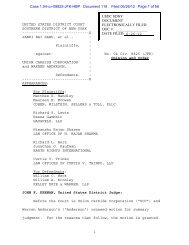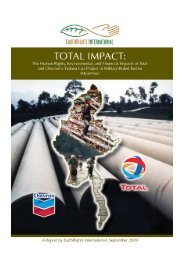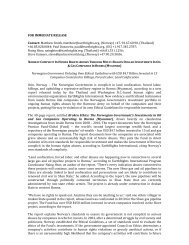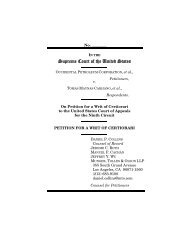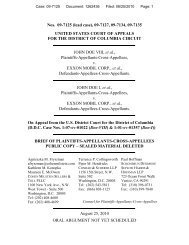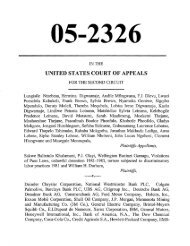The Oil Industry and Human Rights in the Niger Delta - EarthRights ...
The Oil Industry and Human Rights in the Niger Delta - EarthRights ...
The Oil Industry and Human Rights in the Niger Delta - EarthRights ...
You also want an ePaper? Increase the reach of your titles
YUMPU automatically turns print PDFs into web optimized ePapers that Google loves.
All Costs <strong>and</strong> Few Benefits: a Bad Deal for <strong>Delta</strong> ResidentsInhabitants of <strong>the</strong> <strong>Niger</strong> <strong>Delta</strong> receive little <strong>in</strong> return for <strong>the</strong> environmental degradation<strong>and</strong> destruction that jeopardizes <strong>the</strong>ir traditional livelihoods. Instead of reap<strong>in</strong>g benefits<strong>in</strong> education, employment, <strong>and</strong> health, <strong>the</strong>ir fish<strong>in</strong>g stocks have decl<strong>in</strong>ed, <strong>the</strong>ir fields havelost fertility, <strong>and</strong> <strong>the</strong>ir children have been denied opportunities to improve <strong>the</strong> economiccircumstances of <strong>the</strong>ir communities. Meanwhile, foreign oil companies have flourished<strong>in</strong> <strong>the</strong>ir midst, protected <strong>and</strong> supported <strong>in</strong> <strong>the</strong>ir disputes with <strong>the</strong> locals by governmentresources <strong>in</strong> <strong>the</strong> form of armed security personnel.<strong>Human</strong> <strong>Rights</strong> Violations <strong>in</strong> <strong>the</strong> Military Suppression of <strong>Oil</strong> ProtestersWhile five mult<strong>in</strong>ational corporations operate oil fields <strong>in</strong> <strong>Niger</strong>ia, most reported humanrights abuses have been associated with two of <strong>the</strong>m: Shell <strong>and</strong> Chevron. Most of <strong>the</strong>compla<strong>in</strong>ts concern<strong>in</strong>g Shell relate to <strong>the</strong> Ogoni crisis <strong>in</strong> <strong>the</strong> 1990s, although sporadic<strong>in</strong>cidents of violence have been reported <strong>in</strong> recent years. Abuses tied to Chevron aregenerally more recent, <strong>and</strong> Chevron, unlike Shell, does not appear to have changed itsrelationship with <strong>the</strong> <strong>Niger</strong>ian security forces.<strong>Oil</strong> Companies <strong>and</strong> <strong>Niger</strong>ian Security Forces<strong>Niger</strong>ia has one of <strong>the</strong> largest st<strong>and</strong><strong>in</strong>g armies <strong>in</strong> Africa, with an estimated 94,000soldiers <strong>in</strong> <strong>the</strong> armed forces 16 <strong>and</strong> more employed by paramilitary <strong>and</strong> police forces. <strong>The</strong><strong>Niger</strong>ian security forces are widely known to be corrupt, undiscipl<strong>in</strong>ed <strong>and</strong> characterizedby an abysmal human rights record. 17 <strong>The</strong> paramilitary mobile police have an especiallybrutal reputation; <strong>the</strong>y are known locally as <strong>the</strong> “kill <strong>and</strong> go.” <strong>Niger</strong>ia was under directmilitary rule from 1966 to 1979, <strong>and</strong> aga<strong>in</strong> from 1983 until 1999; <strong>in</strong> 1993, <strong>the</strong> <strong>Niger</strong>ianArmy’s own retir<strong>in</strong>g Chief of Staff, Lt. Gen. Salihu Ibrahim, condemned <strong>the</strong> breakdownof professionalism among <strong>the</strong> armed forces, describ<strong>in</strong>g <strong>the</strong> military as “an army ofanyth<strong>in</strong>g is possible.” 18In 1999, with <strong>the</strong> return to civilian rule, an attempt was made to clean up <strong>the</strong> military. 19Yet even this year’s Country Report on <strong>Human</strong> <strong>Rights</strong> Practices for <strong>Niger</strong>ia, published by<strong>the</strong> U.S. Department of State, concludes that <strong>the</strong> human rights record rema<strong>in</strong>s “poor” <strong>and</strong><strong>the</strong> national police, army <strong>and</strong> security forces “committed extrajudicial kill<strong>in</strong>gs” <strong>and</strong> “usedexcessive force” while <strong>the</strong> police were “poorly tra<strong>in</strong>ed . . . <strong>and</strong> poorly supervised” <strong>and</strong>16 D. Farah, “U.S. to Help <strong>Niger</strong>ia Revamp Its Armed Forces, Wash<strong>in</strong>gton Post (April 29, 2000).17 S. Adejumobi, “<strong>The</strong> military <strong>and</strong> <strong>the</strong> national question,” <strong>in</strong> A. Momoh & S. Adejumobi (eds)., <strong>The</strong>National Question <strong>in</strong> <strong>Niger</strong>ia at 155-83 (2002); Amnesty Int’l, A 10 po<strong>in</strong>t Program for <strong>Human</strong> <strong>Rights</strong>Reform (1996); Amnesty Inernational, <strong>Niger</strong>ia: Releases of political prisoners - questions rema<strong>in</strong> aboutpast human rights violations (1999); Amnesty International, <strong>Niger</strong>ia: Security forces constantly fail toprotect <strong>and</strong> respect human rights (2002); U.S. Dep’t of State, Country Reports on <strong>Human</strong> <strong>Rights</strong> Practices:<strong>Niger</strong>ia (multiple years).18 Jane’s Information Group Ltd., Jane’s World Armies at 628 (J.C. O’Halloran, A. Oppenheimer, & M.Stenhouse eds., June 2004).19 UN Office for <strong>the</strong> Coord<strong>in</strong>ation of <strong>Human</strong>itarian Affairs, <strong>Niger</strong>ia: Moves to Clean Up Military (1999).Page 7 of 29



